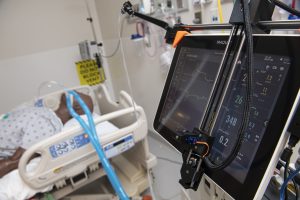
A robotic system created by a team from Johns Hopkins University won the top prize in an international robotics challenge focused on developing solutions for the COVID-19 health crisis and future global pandemics.
“Telerobotics for Remote Control of Medical Equipment in Contagious Environments” won the Best Innovation Award at the inaugural Medical Robotics for Contagious Diseases Challenge 2020.
The challenge – run as part of the EPSRC UK Robotics & Autonomous Systems (UK-RAS) Network’s annual UK Robotics Week celebrations – attracted 21 entries from 13 countries.
The three winners in each category (Application, Innovation, and Design) were unveiled at a virtual award ceremony held February 4, with each winning team receiving prize money of £5000 donated by The Wellcome Trust and Intuitive Surgical.
Treating COVID-19 patients requires hospital personnel to don and doff protective gear every time they enter and leave rooms, even for minor adjustments to machines. The process burns through limited supplies of personal protective equipment. It also wastes valuable time and personnel as the procedure requires an additional person to assist with the changing of gowns, gloves, masks, and other gear.
The winning project is a robotic system that will give medical staff the ability to remotely operate ventilators and other bedside machines from outside intensive care rooms of patients with infectious diseases like COVID-19. If deployed, their invention will help hospitals preserve protective gear, limit staff exposure to COVID-19, and provide more time for clinical work.
The project involved expertise across multiple disciplines—computer science, mechanical engineering, respiratory therapy—spread among faculty, students, and staff from the University of Maryland, Johns Hopkins Medicine, and Johns Hopkins University’s Laboratory for Computational Sensing & Robotics (LCSR) in the Whiting School.
LCSR research scientist Balázs P. Vágvölgyi and University of Maryland mechanical engineering student Misha Khrenov built the working prototype with assistance from LCSR faculty Axel Krieger, Russell Taylor, Peter Kazanzides, and associate research engineer Anton Deguet.
“Currently available ventilators were not designed for remote control, and it may take several years before new ventilators are updated with this feature. The advantage of this simple, low cost telerobotic system is that it can work with existing ventilators and be rapidly deployed in a crisis,” Vágvölgyi said during the team’s acceptance speech.
The team says the system is moving toward controlled clinical studies in the near future.